Why SALÓ Is An Important Film About Power And Not Just Malignant Smut
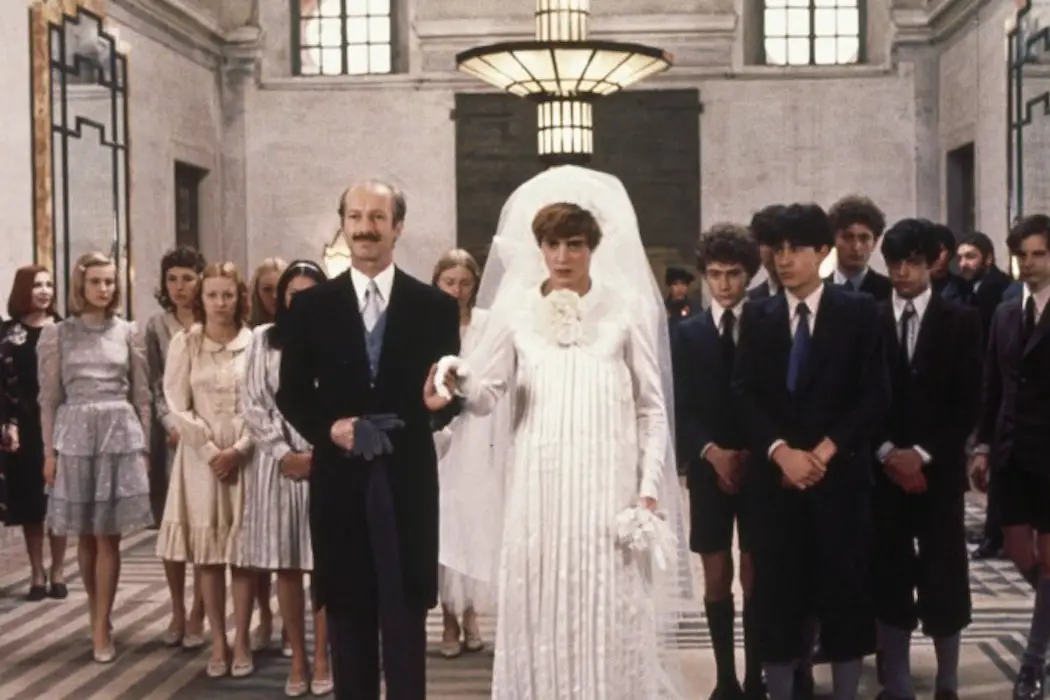
If there is one word that can sum up Dallas…
Salò, or the 120 Days of Sodom was directed and written by Pier Paolo Pasolini and released in 1975. Pasolini, an auteur, outspoken communist, journalist, novelist, poet, and proud homosexual, was no stranger to controversy. Many of his films exude a sense of dream-like realism, complete with an abundance of nudity, sexuality, social alienation, and harsh criticisms of religion and consumerism. The last one especially garnered his disdain, and Salò is his strongest diatribe against consumerism which he called “neo-fascism.”
Salò is about fascism; for an Italian director such as Pasolini, what better time to set the film than 1945? This was when fascism in Italy was at its fever pitch and when the blackshirts’ days were numbered. The title Salò alludes to the puppet state where Mussolini was under the protection of the Nazi regime—but Il Duce is not the main focus here.
Taking from the disgusting classic text of 120 Days of Sodom by the libertine French madman Marquis De Sade, Pasolini ran with the plotline of the original story. Instead of four libertine noblemen, he introduces the four fascist leads: The Duke, The Bishop, The Magistrate, and The President.
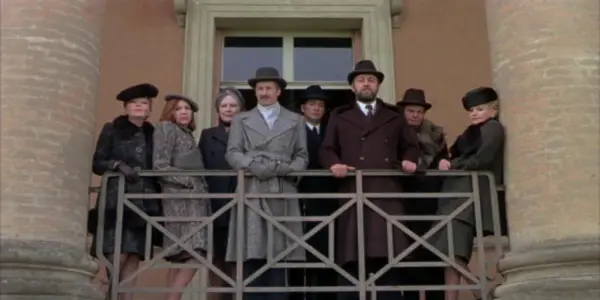
No further information is given about what these men do precisely in the fascist society where they are in places of power. Instead, the film starts with them sitting around a table signing papers as a catalyst for the debased acts they are about to partake in. Much like the novel this film is based on, they kidnap nine young men and nine young women for one hundred and twenty days of violence, sadism, sexual and mental torture. Along with the help of four prostitutes, they are to meet in the main hall to hear various stories about degradation, corruption, and the debasement of the human spirit and body—as told by the four prostitutes themselves.
These stories provide the four libertines—like in Sade’s novel—with inspiration and a means to continually push the limit. And Salò, if anything, is a film that makes the actors, and us, viscerally feel those limits.
Throughout the rest of the movie, the viewer is subjected to these tortures, but Pasolini presents the atrocities we experience as being in hell itself. Hell is not hyperbole but an actual thematic representation via another literary inspiration—Dante’s Divine Comedy, with the most strong cues from his epic poem Inferno. Salò is broken into “circles,” with the prequel kickstarting the film being called “Anteinferno,” followed by the “Circle of Manias”, “Circle of Shit”, and “Circle of Blood,” respectively. The third one is what the film is most notorious for, and has led many to believe that Salò is nothing but a poor excuse for depraved pornography masquerading as something profound.

While Pasolini did state that Salò is “about the anarchy of power,” even the famed John Waters (known for making films in bad taste and is no stranger to absurd excesses) has taken a deep dive into the film. He called it “a beautiful film that intelligently uses obscenity…It is about the pornography of power.” It would be erroneous to think that he means pornography in the same way most do.
Pornography is About Titillation; Salo is Anything But
Watching the film, I could not help but feel like a fly on the wall. The cinematography of this film is gorgeous, with impressively staged shots, effective use of lighting, and a sense of scope and space that makes the viewer believe that they are not a part of what is happening on screen—but an observer. This is what makes the film truly terrifying because all throughout, the viewer feels helpless, passive. Juxtapose this with porn films in general: every shot in a dirty movie is made to make the viewer feel like part of the sexual acts involved on screen.
Camera shots are close up, sounds are exaggerated, genitalia the prime focus. This also applies to the subgenre of horror movies, which movie-goers call “torture porn.” Torture porn films depend on the same sensationalized close-ups, exaggerated acting, and low levels of plot complexity as a means of evoking a strong emotion of either disgust or abject terror. Much in the same way pornography does but instead of orgasms and moaning from actresses’ that sound like wounded animals—torture porn has death screams and buckets of blood-for-the-sake-of-blood.
Salo, on the other hand, everything from the sounds, the shots, the colors, and even the nudity feels cold, distant, muted, like the viewer is not supposed to be here, and being there makes it all feel unnatural. Salo is just a movie that makes you feel dirty—and that is the whole point, instead of being a filthy movie in the colloquial sense. You’re not supposed to relate to the nightmare that is taking place on the screen. But to be repulsed by it.
Even the pain that the victimized characters experience does not elicit the same sympathy as is done in most films of similar themes. However, that is not the entire truth.
Performances are Subdued
Most of the characters in this film might as well be nameless with either a passing mention of who they are and where they fit into the narrative. This was done to make the statement that these are not living beings but numbers and quotas for dehumanization. Much like the fascist society that surrounded Italy at the time, the film’s victims are just another citizen, another worker, another means to an end. This is the core of fascism, an all-or-nothing political philosophy where all members of a fascist society are reduced to being nothing.
You have no hopes, no dreams, no personal thoughts; just a servant of the agenda. Benito Mussolini, the grandaddy of fascist thought, put it all in black and white stark realization:
“All Within the state, nothing outside of the state, nothing against the state…”
The eighteen young men and women are property of the government, and for the most part, they may not be willing participants, but they more often than not put up little-to-no fight. There is no uprising and no plan to liberate themselves; they constantly plot and plan against each other to save their own skins. Pasolini, no doubt, found this all to be appalling and crafted his film utilizing the distancing effect to not evoke pathos in the viewer but to install fear of the dangers of herd conformity. The victims might be mindless drones of a fascist puppet state, doesn’t mean you have to be!
Only a tiny handful of characters are shown sympathy through close camera shots and names—as if to give them some humanity. One is a young girl who had her mother killed in front of her named Renata, a guard who is a communist sympathist, and a young Black woman who works as a maid who is in love with the guard mentioned above. Oh, and the four libertine fascist leaders themselves—strange that an anti-fascist film would try and humanize four of the worst villains in film history, but there is a method to Pasolini’s madness.
Whenever these seven characters are shown on the screen, there is genuine emotion. Renata pushes back mostly by showing grief and pleading, which has no effect but joy from her captors. But she is unlike her fellow prisoners, who usually are blank-faced and lacking any sense of hope. Poor Renata at least tries to spare her own life and keeps the memory of her mother alive. She may be just another victim to ravish, but at the very least, she has not lost her humanity, and the film makes that clear in abundance.
As for the guard and the maid, Salò is filled with emotionless sex, distant, and lacking any sense of joy or celebration, like sexuality is mechanical. The only scene where sex is portrayed positively and pleasantly is between the guard and maid making love. As you could imagine, the fascist libertines will have none of that humanistic nonsense. People of different races having happy sex? The nerve.
After being ratted out by a few of the prisoners, the lovers are discovered by the libertines. They both are to be executed at gunpoint. But before the guard could be killed, he stands up, defiant and nude, and gives a quiet communist salute. It is one of the few moments where the libertines are actually caught off guard. The four villains stand there, almost stunned that someone would dare oppose them, considering that they have been given everything on a silver platter for their entire lives.

Saving face, the four of them gun down the guard and the maid—they simply cannot have anything alive that would remind them of their own potential loss of power. In another subtle hint at the fear of such failure, sprinkled about throughout the film are sounds of guns going off and bombs being dropped outside of the confines of the mansion—the allied forces are not far off. Considering that the film took place in 1945, this means that the libertines’ days are numbered, and they are going to have one last exercise of gross power before they die. The marriage of nihilism and hedonism.
This warped marriage is showcased in several ways (with one of the most striking being discussed later) via an inversion of every moral principle in the book. In the twisted mansion of the libertines, up is down, slavery is freedom, and pain is a pleasure—whether anyone wants it or not. The villains sometimes dress in women’s clothes (in a somewhat mocking manner) and marry their captors just to denigrate what should be a sanctified and happy union. Any sexual act that is considered the norm is to be turned into an exploration of pain.
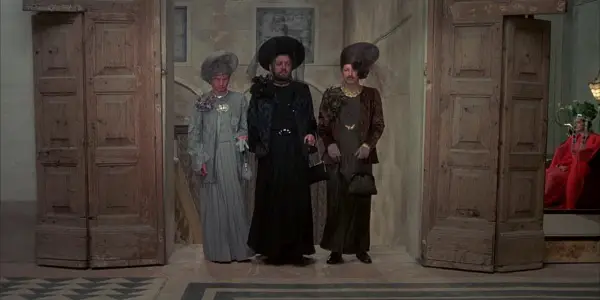
Fascism, at least on paper, is all about order. Still, when one has the power to do whatever they please, the kind of absolute power that only comes with being a representative of a dictatorial regime—such notions of self-control and responsibility to your underlings flies out the window. As the Duke puts it in one scene: “We fascists are the only true anarchists, naturally, once we’re masters of the state. In fact, the one true anarchy is that of power.” The amount of self-awareness and still acting out such villainy is fearsome, but being drunk on power often is.
So, after reading about such atrocities, how can I possibly humanize the libertines, as I have mentioned earlier? Because through the duration of Salò, they (along with the four other female compatriots) are the only ones showing genuine emotions. It is, of course, twisted amusement and dehumanization of others—sadism of the lowest common denominator—but it is still emotion nonetheless. Whereas the eighteen captives are mere degraded representations of the body politic, the libertines are true believers of the fascist ideology itself.
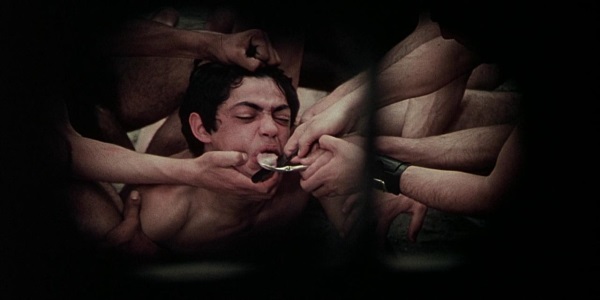
They laugh, they sing, dance, inflict suffering, and then meet together in a room during the wee hours of the morning to get drunk and converse various philosophies, trying to find justification for their vile actions. They have actual discussions and ideas—unlike their victims. It is an unsettling notion that these monsters can be people, like us, in any way, and it is one of the most disturbing aspects of Salò. But it is my opinion that Pasolini was making the point that the actual monsters are not that which go bump in the night, but us.
At the end of the day, Pasolini points the finger at the ones watching it all as if to say, “Why should I care about you? Why should anyone come and save you? You won’t even save yourselves!” After all, a corrupt leader is only in power because the people allow it. What does that say about the complacent citizenry when a fascist monster is more human than you are? A chilling thought, but one worth thinking about.
And then there’s that one scene…
To push further the idea of absolute conformity to dictatorial madness and the libertines being able to make anyone do anything so long as they will it—the most infamous scene of Salò is inevitably brought up. It was not the violence of Salò that made a colleague of mine queasy, but when the film went into the segment known as “The Circle of Shit,” all they could say in response was an uneasy, “Oh, shit…” The scene that makes most viewers feel the most vital sense of distress is when the victims and the libertines all have a banquet of human feces for dinner while the lords talk politics and listen to propaganda on the radio.
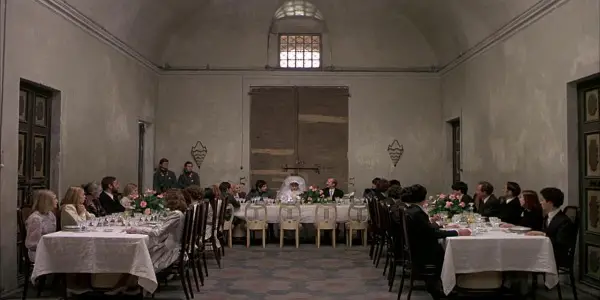
Much like the citizens of fascist Italy and Nazi Germany, the prisoners were eating up the bullshit of dictators. But it goes deeper than that because one of the aspects of modern society that Pasolini had a great disdain for was mass consumerism. The man viewed consumerism, especially that of processed foods, to be pesticide on the human soul and eating literal excrement. He yearned for the days of classical beauty and good food that nourished the body.
He viewed the modern world as a perversion and was thoroughly disgusted with its trajectory. This disgust collected compounded interest when he met his fellow Italians who almost spoke of Italian fascism with a glow. It was the worst case of golden-age syndrome in his eyes. Undoubtedly, living as a child during Mussolini’s reign, let alone growing into a gay young man in such a regime, left an impact on him that I cannot imagine.
“The Circle of Shit” scene in Salo is reminiscent of Pasolini’s disdain for whitewashing past governmental atrocities that the fascists did to the Italian citizens as well as other human beings abroad. And the people not only ate the shit up in spades but asked for seconds! There are some quiet whispers at the table about how disgusting the whole affair is, but again, no protest or sense of self-preservation from the citizenry.
Adding to his feeling of disgusted despondency, Salò was supposed to be part of a series of films that Pasolini would call The Trilogy of Death, a sort of companion piece to his Trilogy of Life series (the movies of the latter being The Decameron, The Canterbury Tales, and Arabian Nights). Those three films are much more jovial in nature, with nudity and sexuality being celebrated and the director throwing heaping amounts of absurdist and slapstick humor. Salò, and the two planned films of Trilogy of Death, were going to the exact opposite affair.
Despite the grim subject matter of Salò, the overall mood of the cast and crew during the film was an upbeat one. Several cast members have gone on record to state that there was a lot of laughter on set along with pranks, immature humor, and an overall fun tone to the whole endeavor. While filming, another movie was being made nearby called Novecento, where the cast and crew challenged them to a friendly game of soccer. Apparently, there we no fights or arguments on set, and when one of the young male actors had a nervous breakdown during one of the many challenging scenes—the rest of the crew was there to comfort him. All of this is the film production version of turning lemons into lemonade.
Tragedy would Strike after the Release of Salo
Pier Paolo Pasolini is the quintessential creative who died, in the literal sense, for his art. In the aftermath of Salo, death was not far behind him. Pasolini was run over several times by his own car, and the autopsy stating that he was partially burned with gasoline after his death. To this day, his murder has been unsolved. And while there are suspects, little evidence has been brought to the forefront. One of the most famous cases is that of the seventeen-year-old Giuseppe Pelosi.
He was found driving Pasolini’s car, and he even confessed to the murder and was convicted. What is interesting is that twenty-nine years later, he rescinded his confession and later went on to say that three men “with a southern accent” are who really killed Pasolini. To this day, the three men remain unknown; by Pelosi’s admission, the trio called Pasolini a “dirty communist.” Could they have been fascist sympathists? It is not far from the realm of possibility, especially considering that—as was stated earlier in this piece—there was a surge of Italian citizens who were waxing nostalgic about the “good-old-days” of fascist Italy.
Salò has been given many indictments and continues to be a divisive film to this day. Is it shocking? Yes. Is it hard to watch? Absolutely. But I believe that my statements above lend themselves to not being shocking for shocking’s sake. If you’re looking for a cheap thrill of depravity where the ordeals of watching them could equate to nauseating and cheaply pornographic in nature, look to exploitative rubbish like I Spit On Your Grave or Caligula. Not with Pasolini’s Salò, a ferocious work of art that sometimes still creeps into my mind like a splinter, and one I will not be revisiting for a very long time.
So what do you think? Have you seen Salo, The 120 Days of Sodom? If so, do you find it meaningful or just an exercise in disgusting smut? Let us know in the comments below!
Does content like this matter to you?
Become a Member and support film journalism. Unlock access to all of Film Inquiry`s great articles. Join a community of like-minded readers who are passionate about cinema - get access to our private members Network, give back to independent filmmakers, and more.
If there is one word that can sum up Dallas Marshall, it would be weird. He is a strange fellow who is also a writer, anime nerd, and film buff who can also talk for hours about mythology and out-there literature. He has been sighted at local used bookstores perusing for horror books and manga. He has also written a book about Japanese animation called Anime Adrenaline! Which can be found on Amazon. You can also catch him on his own website at www.Dallasthewriter.com













